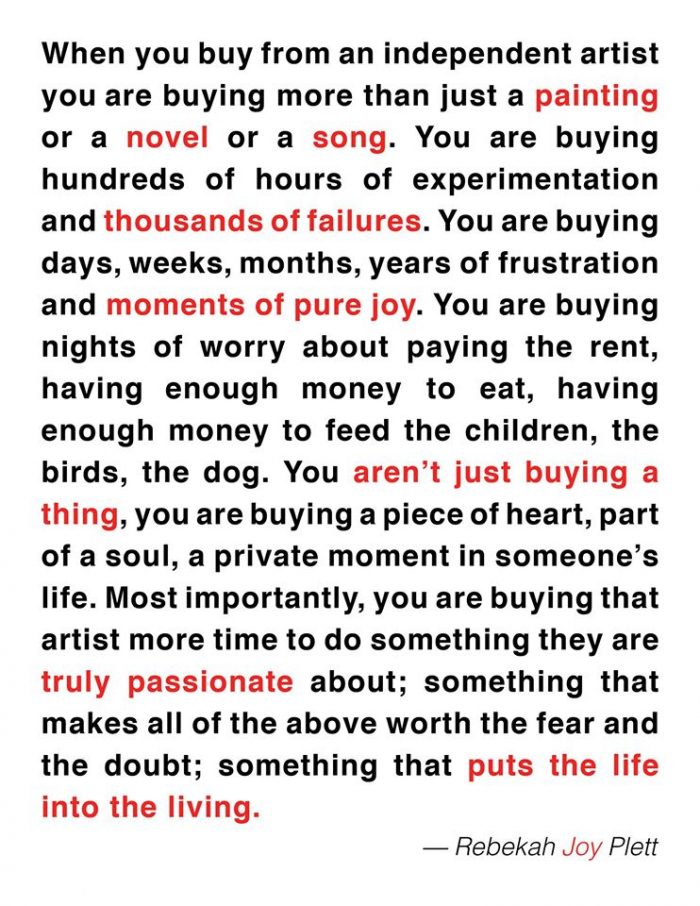Pay them.
Platforms soliciting unpaid work from freelancers with the guise of giving them “exposure” are problematic. What happens when as a society, we promote a culture of “implied trade” without trading in the form of money, the single most usable currency? We slowly drain artists and creatives—the trade that is vulnerable to these kinds of requests.
Artists and creatives are important, now more than ever.
What do we need as a society when we are all social distancing, working from home, apart from our loved ones, and staring at four walls?
We need articles to read, to tell us about the world and politics and ourselves and our neighbors.
We need art to hang on the walls, to look at and see beauty, and feel our own creative energy start to swirl in tune with it.
We need photos: to remember the good times, our loved ones, these hard times, and the stillness of nature which may or may not be accessible during quarantine time, or in general with suburban sprawl.
We need music, to play and sip wine to, and to soften the edges of humanity that recently feel so chiseled.
We need art.
So why not treat their services just the same as any other aspect of economic exchange? When you need a banana, you go to the store and pay money for a banana. It would never occur to you to approach the store clerk with an offer to “post a picture of them with a banana in exchange for a free banana.” When you need an article to use to grow your website, or a photo to use to promote your book, you need to pay the artist.
An offer of exposure is not enough, and depletes the creative industry. Service in exchange for exposure offers have become normalized.
Here’s a reminder of how they actually feel, still and every time, for the artist:
When you’re a freelancer, cold email inquiries are like unmarked packages that show up midweek. They are exciting. You never know what character is behind the inquiry: Dr. Phil? Mr. Obama? Gwenyth Paltrow, do you finally recognise that I am the daughter to your Goop family that you never knew you missed?!
Then, sometimes you open the package, and see that it’s a load of crap. Specifically, the crap I’m referring to is the unoriginal and overplayed request to submit an article in exchange for…nothing.
The emails are always some version of:
“Hi, we noticed that your writing and credentials are inline with our platform! We would love to have you as a guest contributor. We can’t afford to pay you, but we would be willing to post your biography with your article, which can link to your own personal website.”
When I was a naïve, fresh-out-of-school kiddo, I used to be ecstatic about these things. I wrote more free articles than I care to remember. There’s a period of life where this is appropriate. Everybody needs to go through some sort of period of “resume building” in order to reach your intended audience and level of street cred. The hard part is knowing when to stop—when are you good enough to be good enough?
To be real, I’ve also been every bit a part of the problem. How long did I agree to this nonmonetary trade? Much longer than I should have. I didn’t feel great about the “it is a great opportunity for exposure” in exchange for real work on my part. Yet, I did it anyway, partly because it seemed entitled to turn down such an offer and instead hold out for money. And in part, because I wasn’t sure that creative work for me, such as writing, would ever really be worth money.
When I started saying “no,” I started making money.
I finally had enough, and with the courage that comes with turning 30, emailed one such platform, “Hi, my per article rate is ___. This is ___ percent under the market value for such articles, however I’m willing to make the compromise based on my green nature in this field.”
And I’ll be darned, they paid me what I asked. Then, I did it again. After six months of consistently high-performing articles, I went back into the ring:
“Hi, after proving my performance as a writer and generating articles which consistently perform in the top 10 percent of your blog posts, I’d like to increase my per-article rate to market value, which is $___ per article. This new rate is effective starting next month. Let me know if you can accommodate.”
And I’ll be whoozled, they agreed again.
Just like that, I started getting paid fair market price for my work. Which seemed like a miracle at the time, and in hindsight is really just…fair. The only articles I now write for free are self-expressions written over coffee, those seeds of myself that deserve to be tossed into the breeze of “for anybody who cares.”
Women, especially you.
Women are especially vulnerable to this type of game. Women are consistently told by society that our worth lies in our selflessness—our ability to lift and love. This creates an open wound that is still fresh every time we get an offer to “benefit the world through volunteer actions.”
Even work that benefits the good, deserves to be compensated. (Doesn’t work that benefits the good especially deserve compensation? Do we only compensate selfish work?) As women, we cannot possibly uplift and uphold if we are so overburdened with unpaid labors of the heart.
Here are some examples of alternative models, other than soliciting unpaid labor:
- If you are using writing from others to bring attention or clicks to your own services, provide some sort of a “pay per view” option to the author. You did not earn the attention their article brought to your website so you deserve zero percent of that resulting income. Agreeing to give them a percentage is not kind, it’s just less stingy.
- Consider doing away with the “solicit free contributors” model, and instead hire a full-time writer for your platform. This way, they can generate content based on your brand, and you can pay them in a relationship that is mutually beneficial.
- Strapped for cash? Consider some sort of pay-for-performance system, such as Elephant Journal’s Ecosystem rating. Elephant is up-front about the fact that they can’t currently afford to pay all writers. To remedy this, they’ve created a weighted system to generate compensation for those authors who bring their website the most love.
If you’re an artist who doesn’t need or want money, consider taking it anyway. You can always pass it along.
Some people don’t need or want money in exchange for their work. Maybe a sense of contribution to society, or the opportunity to share your creativity—your free labor—is payment enough. Except, this devalues those who do need payment: whether it be to pay rent, buy groceries, purchase toilet paper at a newly-primed rate…you know, just live.
I’m still exploring this, but one idea that a friend does which seems to accommodate both the givers and those who need the exchange of money: he asks that the recipient of his services donate to a not-for-profit of their choice, and send him a picture of the receipt. Clean and simple. He acknowledges that he doesn’t want to receive money for his craft, but also that the exchange of money to support craftsmen is important. So, this is his way of using his services to still put money toward something good, in return for his efforts.
Of course, you could also still collect money for payment, and then donate that to the cause of your choice. Either way seems solid.
So, to summarize: Solicitors, we want your money. Platform owners, social media influencers…we, the artists, are here to say we want that money.
And we need it to live. Just like you need our art to live.
No shame in our game.
Fellow crafts[wo]men: know your value, and ask for it. Women, especially you.
We are worthy.
~











Read 5 comments and reply